Top Industry-Specific Generative AI Use Cases in 2026
As a leading Generative AI software development services company, the NextGen Invent team hopes that this blog will assist you in understanding the business applications of Generative AI and helping to realize its full potential.
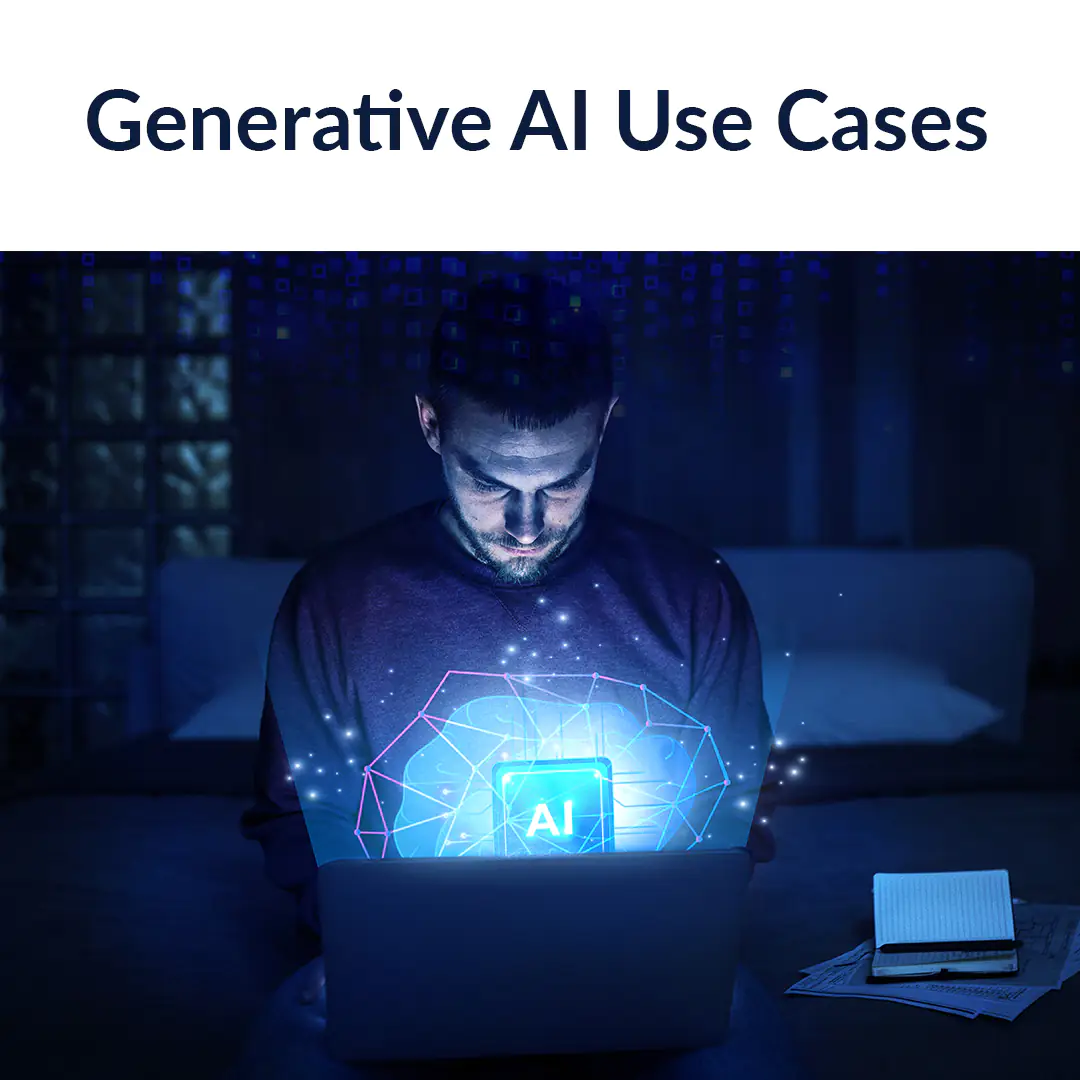
Solve Conversational Complexity with Advanced Generative AI Models, Crafting Intelligent Chatbots for Seamless Customer Interactions
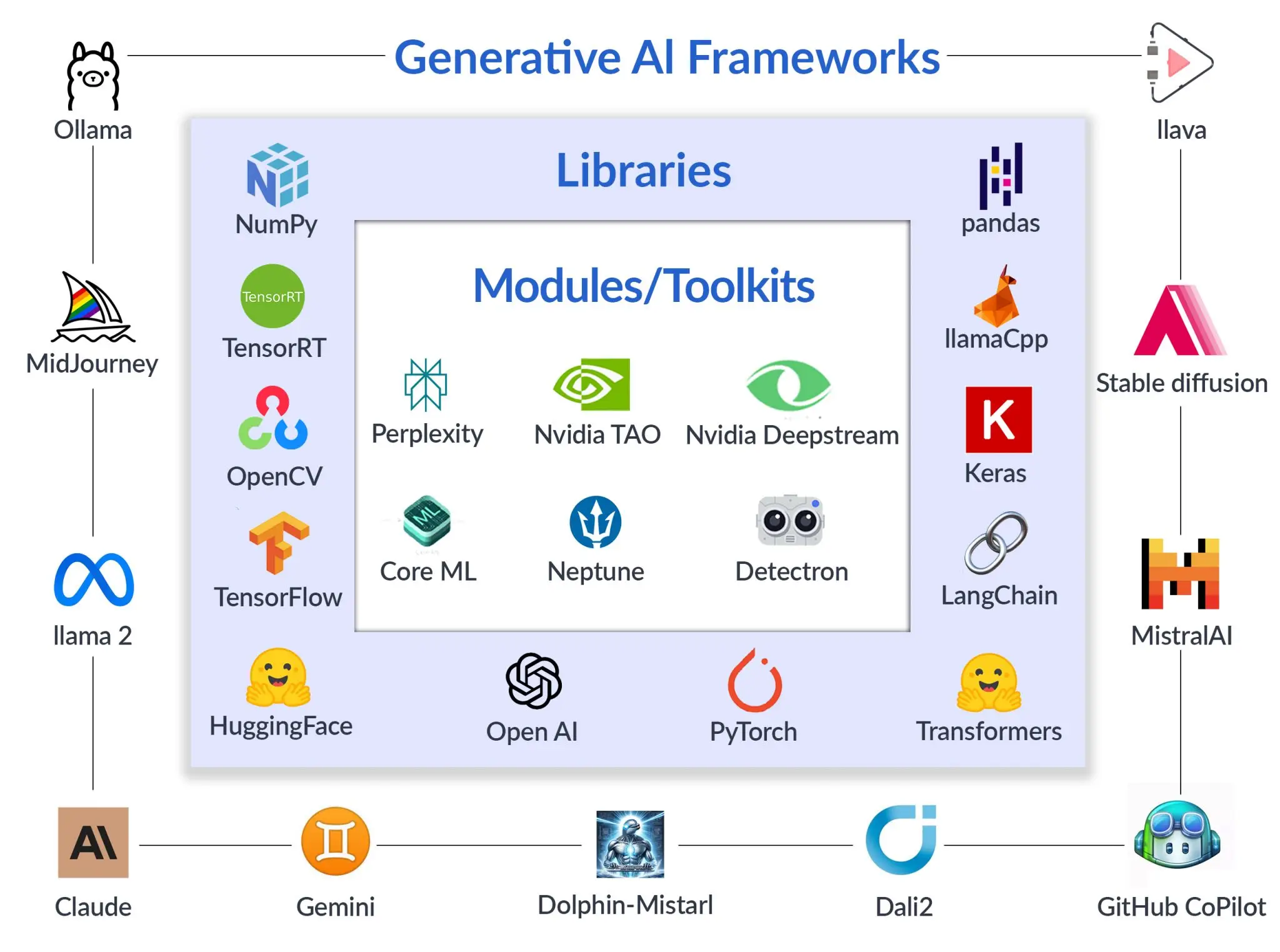
“Gen AI is poised to unleash a powerful wave of productivity growth that will affect all industries and could add as much as $4.4 trillion annually to the global economy. It will affect all industries, with the largest gains arising from its deployment in retail and consumer-packaged goods, banking, pharmaceuticals, and medical products.”– Mckinsey
Overview of Generative AI
Generative AI stands out in artificial intelligence due to its foundational concepts. Understanding these concepts is crucial for unlocking its full potential and exploring its diverse applications within the field.
- Gen AI relies on machine learning principles, where algorithms analyze existing datasets and generate new ones. Understanding patterns, structures, and relationships within the data is crucial for the model to create content resembling the original dataset. This process enables Generative AI to produce output closely mirroring the features of the input data, unlocking various applications within the field.
- Through iterative refinement, these algorithms continuously improve the Generative AI model’s ability to produce realistic and contextually relevant data. This symbiotic relationship between machine learning and Generative AI drives innovation and advancements in various fields.
Demystifying Gen AI
Generative AI leverages vast databases containing diverse data types like text, images, and code. Specific generational models, tailored for different tasks, excel in various domains. Models like Generative Adversarial Networks (GANs) or Variational Autoencoders (VAEs) handle visual data, while Autoregressive models or Large Language Models (LLMs) excel in text generation. These models utilize complex machine learning algorithms to discern patterns and create statistical models. When prompted, the model navigates a probability map, guided by user input, to generate unique outputs while staying connected to the training data. Each output is a creative construction based on probability and user input. Some models specialize in text generation, information summarization, or image creation, requiring responsible data acquisition, parameter fine-tuning, and bias minimization for optimal performance and help in Generative AI use cases for different industries.
Industry-Specific Generative AI Use Cases & Applications
Gen AI use cases span diverse industries, harnessing its capacity to learn patterns, mimic human behavior, and generate innovative content. This versatility enables its application across various sectors, demonstrating its adaptability and potential for transformative impact.
 Healthcare
Healthcare
Generative AI use cases in healthcare are driving transformative changes by revolutionizing pharmacological research, personalized therapy, and diagnostics. Through innovative applications, Generative AI plays a pivotal role in reshaping healthcare practices, enhancing patient care, and advancing medical technologies. Its ability to learn patterns and generate creative solutions contributes significantly to the evolution of healthcare delivery and outcomes.
1. Medical Research
Generative AI optimizes patient-trial matching and data processing in healthcare, revolutionizing efficiency, and insights. By employing innovative algorithms, it swiftly identifies suitable clinical trials for patients while integrating various data modalities seamlessly. This advancement accelerates research, expediting breakthroughs and enhancing patient outcomes. Moreover, it heralds a transformative era in healthcare, where technology intersects with medicine to unlock unprecedented potential. Through precise data analysis and streamlined processes, Generative AI facilitates unparalleled advancements at the forefront of healthcare innovation.
2. Clinical Efficiency
The integration of longitudinal patient data using Generative AI yields complete insights that improve therapeutic efficiency. Through automated interpretation of medical images, procedures are optimized, leading to improved accuracy and expedited healthcare delivery, benefiting patient outcomes. This technology amalgamates diverse patient records, allowing for a holistic understanding of medical history. Streamlining processes and automating tasks, such as image analysis, enables healthcare professionals to make informed decisions swiftly. Generative AI stands as a cornerstone in modern healthcare, harnessing data-driven approaches to revolutionize patient care and advance medical practices.
3. Operational Efficiency
Generative AI automates clinical coding, patient consent management, and referral letter generation, transforming workflows with intelligent document processing. This advancement enhances administrative efficiency by significantly speeding up tasks and ensuring accuracy. By leveraging advanced algorithms, it seamlessly handles various administrative processes, reducing manual workload and potential errors. It streamlines operations within healthcare institutions, enabling staff to focus more on patient care while optimizing resource allocation. This technology marks a paradigm shift in healthcare administration, exemplifying how automation can revolutionize operational efficiency and improve overall healthcare delivery.
Logistics & Supply Chain
By streamlining demand forecasting, inventory forecasting, and route planning, Generative AI transforms supply chain management and logistics. It improves efficiency by evaluating large volumes of data to cut down on delivery times and minimize transportation costs. Intelligent picking systems and automated inventory management are other ways it simplifies warehouse operations. Agile decision-making is made possible by Generative AI, which ensures that companies can quickly adjust to shifting consumer needs and market conditions.
1. Streamlining Transport Operations
Generative AI empowers transportation operators to seamlessly gather, interpret, and analyze real-time data from diverse sources, enhancing their ability to handle disturbances with precision. By harnessing advanced data-driven insights, it enhances operational efficiency to unprecedented levels. This technology enables operators to make informed decisions swiftly, optimizing routes, schedules, and resource allocation. Through the integration of intelligent algorithms, Generative AI not only improves accuracy in addressing disruptions but also unlocks new levels of efficiency, revolutionizing the transportation industry.
2. Route Optimization
Delivery route optimization is revolutionized by Generative AI algorithms, which consider multiple aspects including truck capacity, distance, traffic conditions, and delivery windows. This comprehensive approach results in more cost-effective routes, minimizing fuel consumption and reducing transportation expenses. Moreover, it enhances on-time delivery performance by strategically planning routes to mitigate delays. By leveraging advanced algorithms, Generative AI maximizes efficiency in logistics operations, translating into improved profitability and customer satisfaction. This technology marks a significant advancement in the logistics industry, reshaping how deliveries are executed with precision and economy.
3. Inventory Optimization
Generative AI optimizes inventory management by analyzing lead times, demand trends, and key variables. Establishing appropriate reorder points, safety stock levels, and replenishment strategies enables businesses to minimize holding costs while ensuring sufficient stock availability. This innovative approach ensures that inventory levels are finely tuned to meet demand fluctuations effectively. Generative AI algorithms adapt dynamically to changing conditions, ensuring optimal inventory levels. This technological innovation enhances operational efficiency and profitability by synchronizing inventory management with demand patterns seamlessly.
Finance & Banking
Generative AI use cases in banking and finance involve leveraging the technology to automate routine tasks, enhance operational efficiency, and improve decision-making processes. This entails employing advanced algorithms to streamline operations within fintech organizations, particularly banks, by reducing manual efforts and enabling smarter assessments. Ultimately, Generative AI empowers financial institutions to optimize their workflows, resulting in heightened efficiency and more informed strategic decisions.
1. Real-Time Fraud Detection
Generative AI is instrumental in analyzing vast transaction datasets to detect patterns or irregularities indicative of fraudulent activity. Scrutinizing large-scale financial data with cutting-edge algorithms enhances security measures by swiftly identifying and halting potentially fraudulent transactions. This technology enables financial institutions to proactively mitigate risks and protect both themselves and their customers from fraudulent activities. Through its ability to process complex data sets efficiently, Generative AI strengthens the integrity of financial operations, ensuring a safer and more secure financial ecosystem.
2. Portfolio Management
Investment portfolios are optimized by generative AI through the analysis of market data and the consideration of variables including volatility, risk, and potential return. With the use of this cutting-edge technology, profitable investment opportunities can be found, and comprehensive market assessments can improve investor decision-making. Generative AI ensures that portfolios are carefully diversified to optimize returns and limit risk exposure by utilizing complex algorithms. This leads to better-informed investing choices, which in turn produce portfolios that are positioned to take advantage of market opportunities and provide investors with profitable returns.
3. Personalized Banking Experiences
By using customer data to provide customized solutions, Generative AI improves customer relations in the banking industry. It delivers personalized financial advice, recommends relevant products, and provides customized services based on individual preferences and needs. This technology utilizes advanced algorithms to analyze vast amounts of data, enabling banks to understand their customers better and anticipate their requirements accurately. By offering specialized and perceptive solutions, Generative AI strengthens customer relationships, fosters trust, and improves satisfaction levels within the banking sector.
Retail & E-Commerce
Generative AI use cases in retail leverage its ability to generate new content, provide valuable insights, and enhance user experiences. This technology transforms retail and e-commerce sectors by dynamically creating fresh content, analyzing data to uncover actionable insights, and optimizing user interactions. By harnessing Generative AI, retailers can stay ahead of market trends, personalize experiences, and drive engagement with customers.
1. Demand Forecasting
Generative AI models revolutionize retail inventory management by accurately forecasting demand through analysis of historical sales data and external variables. This advanced technology enables effective inventory control strategies, minimizing stockouts, mitigating overstocking risks, and optimizing stock levels. By leveraging innovative algorithms, retailers can anticipate fluctuations in consumer demand with precision, ensuring products are available when needed while avoiding excess inventory costs. Generative AI enhances operational efficiency and profitability in retail by aligning inventory levels closely with market dynamics, improving customer satisfaction and driving revenue growth.
2. Dynamic Inventory Management
Integrating Generative AI into inventory systems reduces carrying costs by enabling real-time optimization. By considering factors such as seasonality, trends, and market dynamics, this technology dynamically adjusts inventory levels to meet demand efficiently. It enhances productivity by ensuring that stock levels align closely with current market conditions, minimizing the risk of excess inventory or stockouts. Generative AI optimizes inventory management processes, allowing businesses to operate more efficiently and allocate resources effectively, leading to improved profitability and competitiveness in the market.
3. Customer Segmentation
Generative AI categorizes consumers based on behavior, preferences, and demographics, enabling retailers to tailor product offerings and marketing strategies accordingly. By identifying distinct consumer segments, businesses can personalize engagement tactics, optimizing satisfaction and loyalty. This technology empowers retailers to target specific client groups effectively, delivering tailored experiences that resonate with individual preferences. Through the strategic customization of products and marketing approaches, generative AI enhances customer engagement and drives sales growth, fostering lasting relationships with diverse consumer segments.
Manufacturing
Generative AI use cases in manufacturing abound, offering various advantages. This technology optimizes production processes, enhances product design through simulation and iteration, and predicts equipment failures for proactive maintenance. By analyzing vast datasets, Generative AI improves operational efficiency, reduces downtime, and fosters innovation, driving cost savings and ensuring competitiveness in the manufacturing sector.
1. Quality Improvement through Defect Detection
Generative AI scrutinizes sensor data in manufacturing, employing machine learning to detect patterns indicative of product defects. Through proactive identification and resolution of issues pre-shipment, recall risks diminish, bolstering customer satisfaction with consistently high-quality products. By leveraging advanced algorithms, this technology enhances defect detection accuracy, minimizing the likelihood of faulty products reaching consumers. Generative AI optimizes manufacturing processes, ensuring product integrity and reliability while mitigating risks associated with recalls, thereby fostering a stronger brand reputation and loyalty among customers.
2. Energy Consumption Optimization
By examining machine behavior and process data, Generative AI maximizes the use of energy in production. Manufacturers sustain industrial output by identifying energy-saving opportunities, thereby reducing operational expenses, and promoting sustainability. This advanced technology enhances efficiency by pinpointing areas where energy consumption can be minimized without compromising productivity. By implementing these insights, manufacturers not only cut costs but also contribute to environmental conservation efforts. Generative AI revolutionizes manufacturing practices, aligning economic benefits with ecological responsibility, and ensuring a greener, more sustainable future for industries worldwide.
3. Predictive Maintenance & Downtime Reduction
Generative AI analyzes machine sensor data to foresee potential issues, empowering equipment manufacturers to schedule proactive maintenance. By preemptively addressing maintenance needs, downtime is minimized, enhancing overall equipment performance and operational efficiency. This strategic approach optimizes production schedules, ensuring uninterrupted workflow and maximizing output. Generative AI’s predictive capabilities enable manufacturers to maintain equipment reliability and prolong lifespan, reducing operational costs and boosting productivity. This technological innovation not only mitigates risks associated with unexpected breakdowns but also fosters a more streamlined and efficient manufacturing process.
Technology, Media & Telecommunication
Generative AI transforms the technology, media, and telecommunications sectors by offering innovative solutions across various domains. In technology, it optimizes software development processes, streamlines workflow automation, and enhances cybersecurity measures. In media, Generative AI enables personalized content creation, targeted advertising, and audience engagement strategies. In telecommunications, it improves network optimization, enhances customer service through chatbots, and facilitates predictive maintenance for infrastructure.
1. Create Sales Support Chatbots
Generative AI-driven conversational chatbots revolutionize marketing and customer care by providing comprehensive assistance to clients. These chatbots aid customers in understanding products, offer technical support, and ensure timely, multilingual, 24/7 customer service. Leveraging advanced algorithms, they engage users in natural language conversations, addressing inquiries and resolving issues efficiently. By automating routine tasks and offering personalized assistance, Generative AI-powered chatbots enhance customer satisfaction, streamline operations, and foster stronger brand-consumer relationships in the domain of technology, media, and telecommunications industries.
2. Call Center Operations & Data Optimization
Call centers may optimize their revenue streams by employing Generative AI to analyze customer complaints, records, and agent performance efficiently. Rapid insights derived from this analysis drive performance improvements, enhancing service quality and unlocking new avenues for operational effectiveness. By leveraging advanced algorithms, call centers can identify trends, address issues promptly, and optimize resource allocation. Generative AI enables proactive decision-making, fostering a culture of continuous improvement within call center operations. It enhances service standards, increases efficiency, and maximizes revenue generation potential.
3. Agent Assistance: Search & Summarization
Generative AI enhances customer care staff efficiency by employing auto-summarization techniques for streamlined communication and trend tracking. This technology enables quick responses across preferred channels, ensuring timely assistance. Through concise references generated by AI, support efficiency is improved, allowing teams to stay abreast of evolving customer service demands. By automating tedious tasks and providing actionable insights, Generative AI enables customer care staff to deliver prompt and effective assistance, thereby enhancing overall service quality and meeting the dynamic needs of customers efficiently.
Marketing & Sales
Generative AI use cases in marketing analyze consumer data to personalize marketing campaigns, optimize advertising targeting, and forecast demand accurately. By generating compelling content and automating repetitive tasks, Generative AI streamlines sales processes boosts customer engagement, and drives revenue growth. This technology empowers businesses to create dynamic, data-driven marketing strategies that resonate with their target audience and maximize sales effectiveness.
1. Create Sales Support Chatbots
Conversational chatbots powered by Generative AI enhance marketing and customer support efforts by assisting customers with product comprehension, offering technical assistance, and multilingual, round-the-clock customer service. These chatbots utilize advanced algorithms to engage users in natural language interactions, resolving inquiries efficiently. By automating routine tasks and offering personalized assistance, they bolster customer satisfaction and streamline operations. Generative AI-powered chatbots represent a pivotal advancement in enhancing customer experiences, augmenting brand loyalty, and driving business growth.
2. Generate 3D Objects, Images, Audio, and Video
Generative AI transforms call centers into revenue-generating hubs by analyzing customer complaints, records, and agent performance with precision. Rapid insights derived from this analysis drive performance improvements, enhancing service quality and uncovering new avenues for operational efficiency. By leveraging advanced algorithms, call centers optimize resource allocation, address issues promptly, and identify emerging trends. Generative AI empowers proactive decision-making, fostering a culture of continuous improvement within call center operations, enhancing service standards, and maximizing revenue potential.
3. Virtual Assistants
Generative AI enhances customer care staff efficiency by employing auto-summarization for streamlined communication and trend tracking. This technology enables rapid response across preferred channels, ensuring timely assistance. Through concise references generated by AI, support efficiency is heightened, enabling teams to adapt customer service effectively. By automating repetitive tasks and providing actionable insights, Generative AI facilitates quick reactions to customer inquiries, thus improving overall support quality and enabling businesses to stay ahead in the ever-evolving realm of customer service.
Future Prospects Awaiting Generative AI
By 2040, Generative AI is anticipated to reach a level where it can compete with the top 25% of human workers across various tasks, according to McKinsey. This advancement hinges on integrating perceptual systems, enabling AI to simulate human senses such as touch and smell, thus expanding its comprehension beyond language and visuals. Moreover, Generative AI models might surpass humans in emotion recognition by interpreting physiological signals like heart rate and breathing patterns, providing deeper insights into emotional states. Despite these strides, bias remains a significant concern in Generative AI models, prompting the need for ethical data sets and robust safeguards against discrimination. As workplaces undergo digital transformations, skill requirements will shift, but vigilance against potential misuse is imperative to mitigate risks.
Generative AI’s impact spans from automating mundane tasks to fostering creativity in content production. However, it necessitates meticulous attention to data security, ethical considerations, and adaptation to evolving best practices. Like how smartphones revolutionized business operations, Generative AI business use cases are poised to reshape various industries. Its wide-ranging applications underscore the importance of responsible deployment and proactive measures to ensure its transformative potential is realized ethically and securely.
How NextGen Invent Transform Diverse Industry Verticals?
NextGen Invent’s Generative AI software development services revolutionize multiple industries by optimizing operational procedures. Our engineers specialize in developing customized applications using advanced language models like GPT-4, Vicuna, Llama 2, and GPT-NeoX. These apps process diverse data types effortlessly, ensuring compliance with stringent privacy regulations. By harnessing Generative AI’s capabilities, we deliver context-aware applications that enhance decision-making, deepen insights, and boost productivity. From real-time data analytics to addressing evolving consumer preferences, our developed solutions address various industry challenges. Generative AI models recognize patterns, extract knowledge, and produce content autonomously, empowering individuals and businesses to enhance efficiency. However, we acknowledge the ethical implications and advocate for responsible AI deployment. As we anticipate future advancements in Generative AI, we foresee even more innovative applications blurring the lines between human and machine collaboration.
NextGen Invent is poised to lead the way in leveraging Generative AI’s transformative potential, shaping a future where innovation, efficiency, and connectivity thrive at the intersection of human ingenuity and artificial intelligence. Contact us to harness the full power of Generative AI for your business needs.
Related Blogs
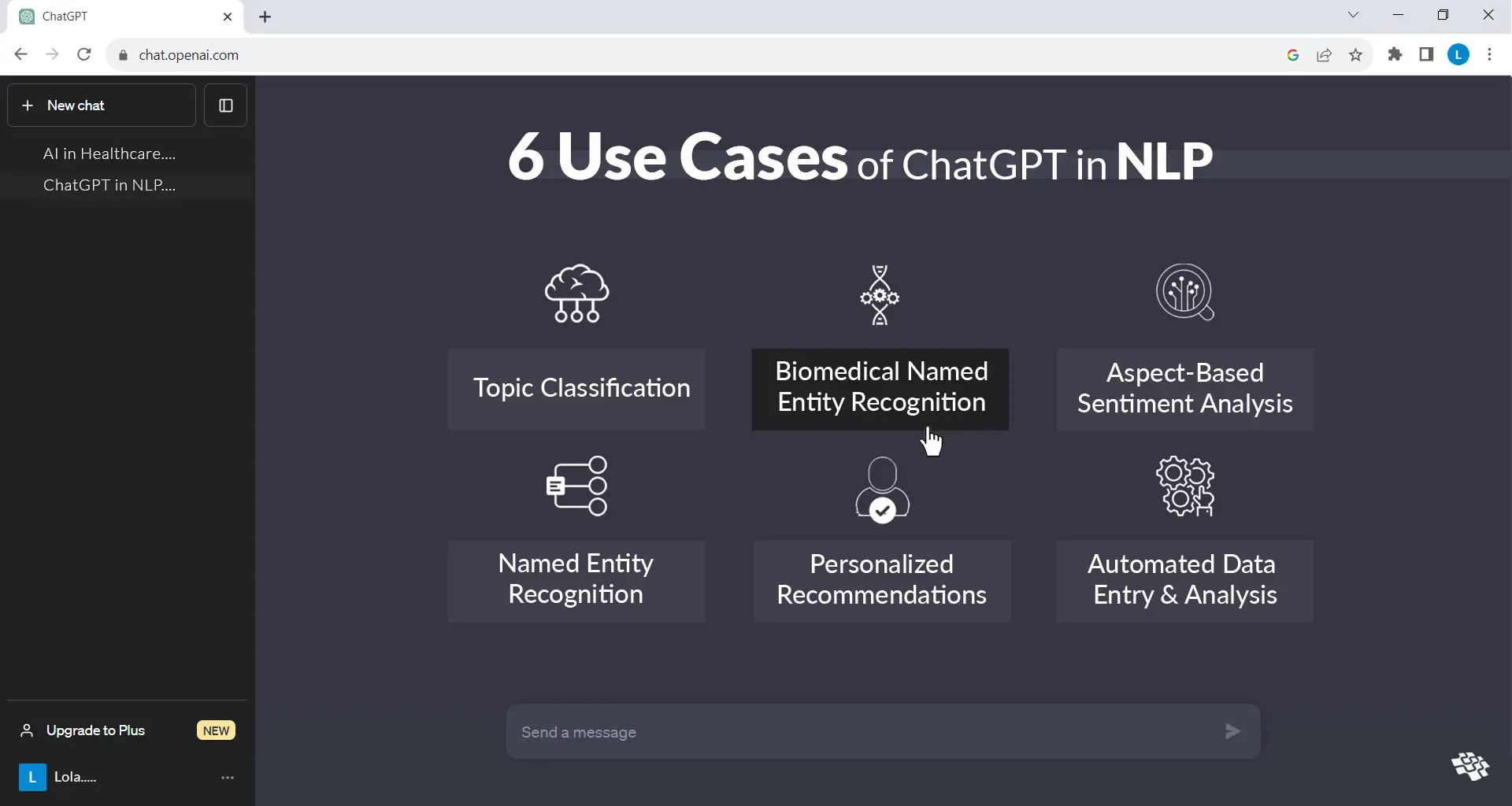
ChatGPT’s Use Cases in Natural Language Processing for Your Business
ChatGPT, an AI-powered real-time Natural Language Processing program by OpenAI, produces human-like text responses, an evolution of the GPT language model. NLP is already prevalent in applications like spam filtering and machine translation.
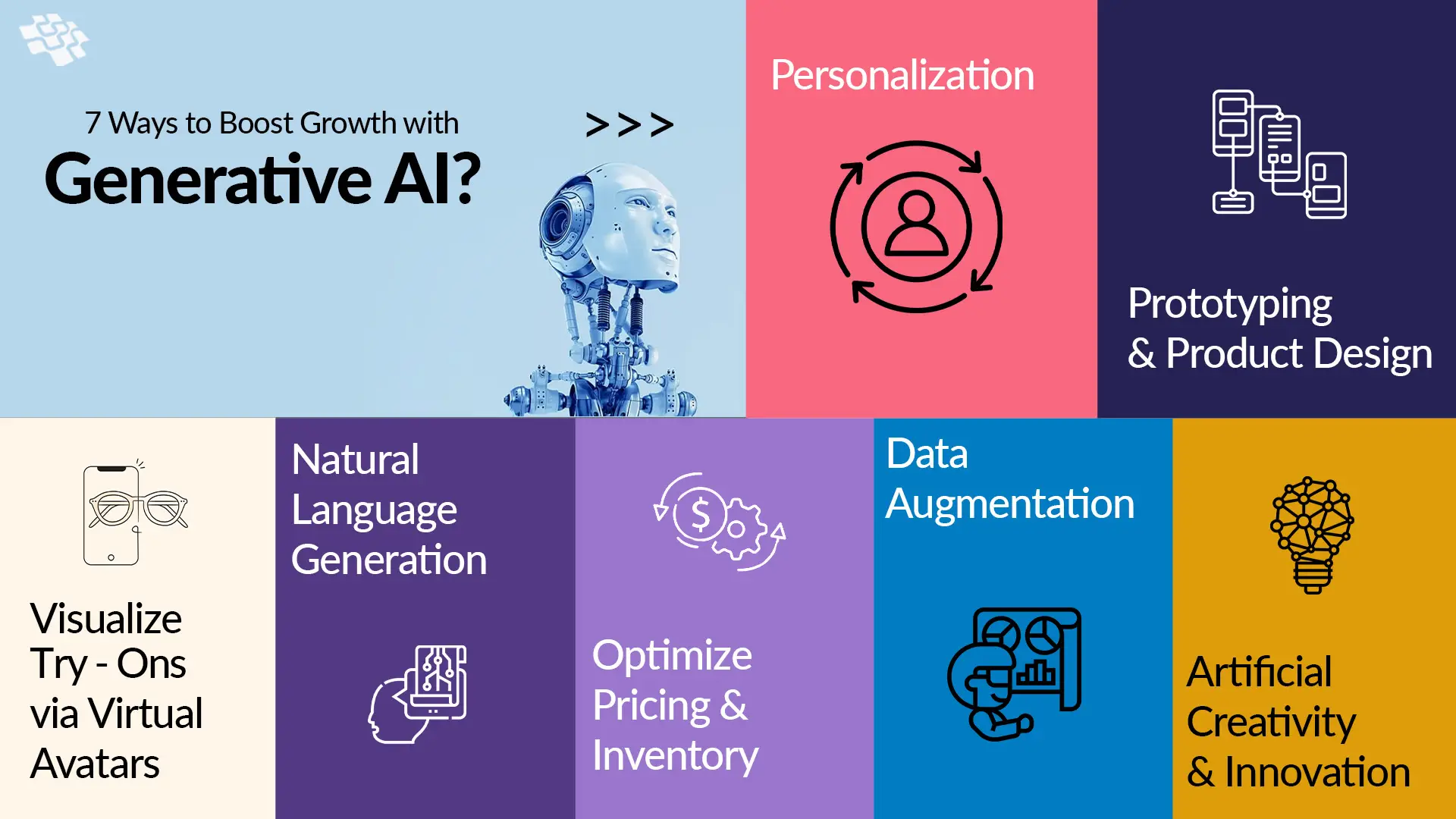
7 Ways to Boost Growth with Gen AI for Business
For many corporations, Generative AI (Gen AI) has evolved from a futuristic notion to an integral part of their day-to-day operations. Remarkably, a recent poll discovered that 91% of leading companies actively invest in Gen AI, fully acknowledging its indispensable role in driving innovation and efficiency.
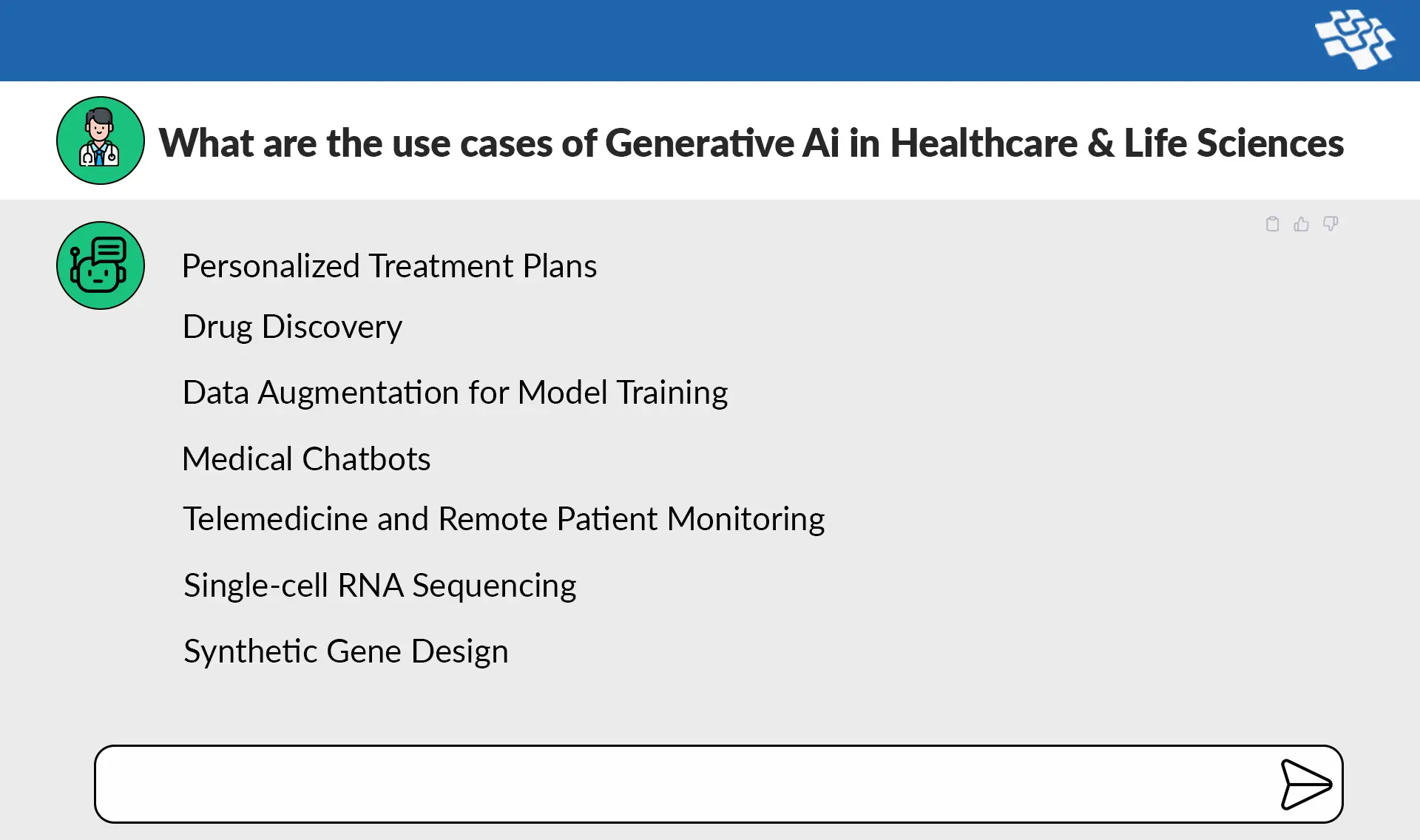
Adoption of Generative AI in Healthcare & Life Sciences
Generative AI in healthcare and life sciences is rapidly transforming the landscape, offering immense potential to revolutionize the industry. It’s ability to analyze large-scale medical data and create new content elevates the standard of care, increases accessibility, and reduces disparities in research and treatment.
Stay In the Know
Get Latest updates and industry insights every month.
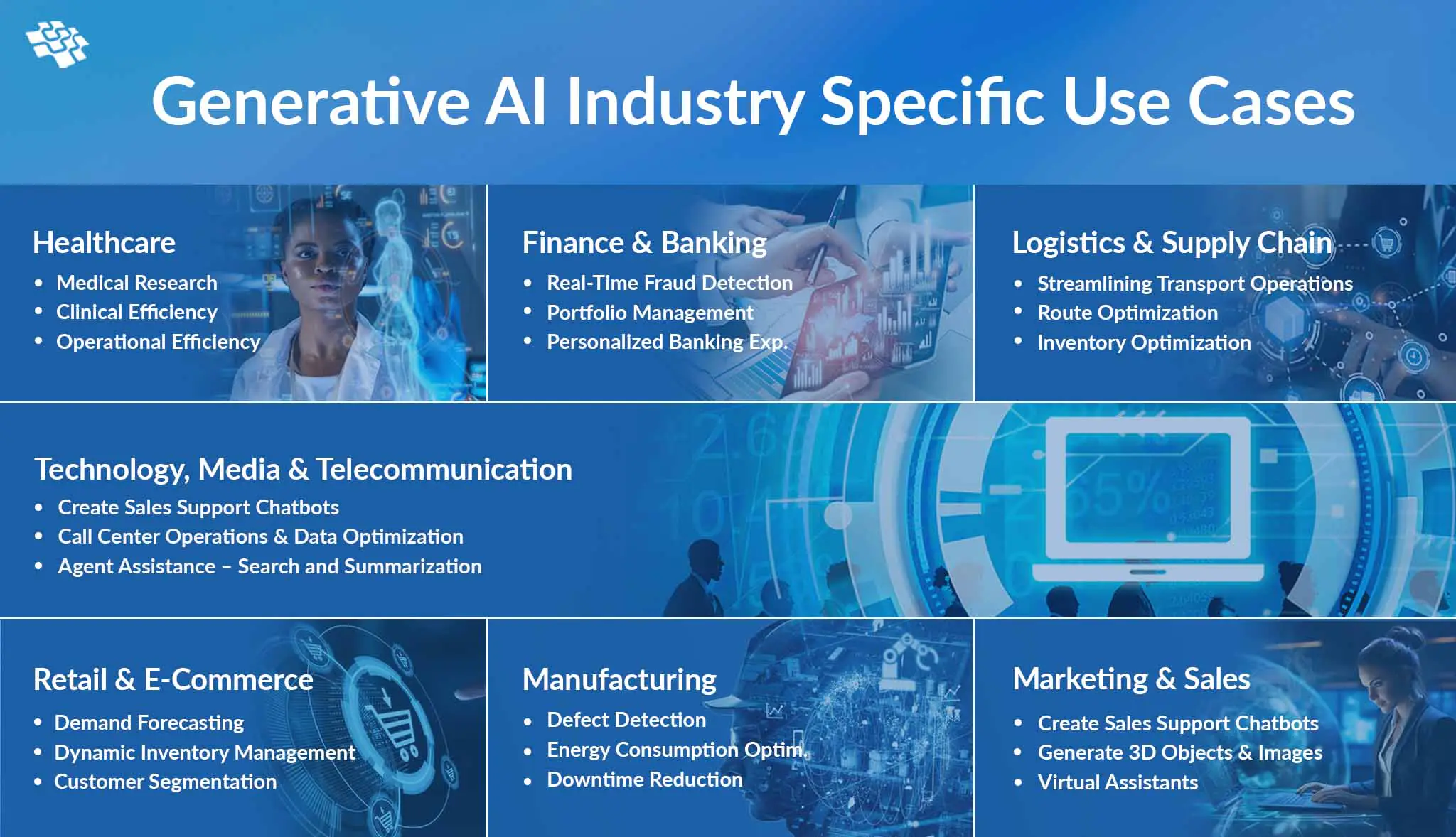 Healthcare
Healthcare